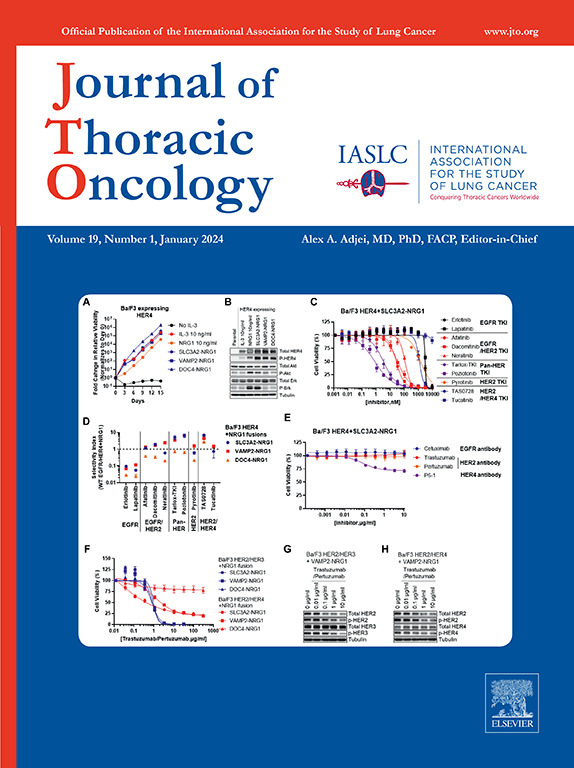简要报告:伊沃尼西单抗联合依托泊苷加卡铂一线治疗广泛期小细胞肺癌:Ib 期临床试验结果。
IF 21
1区 医学
Q1 ONCOLOGY
引用次数: 0
摘要
简介伊沃尼西单抗是一种人源化IgG1双特异性抗PD-1/VEGF抗体。本研究旨在评估伊沃尼西单抗联合依托泊苷和卡铂作为广泛期小细胞肺癌(ES-SCLC)患者一线治疗的安全性和耐受性,并探讨该方案的主要疗效:符合条件的患者接受静脉注射依维莫司单抗(ivonescimab)3 mg/kg、10 mg/kg或20 mg/kg,每3周一次,与依托泊苷和卡铂联合使用,最多4个周期,然后使用依维莫司单抗作为维持治疗。主要终点是安全性和客观反应率(ORR):2021年4月23日至2021年12月2日,35名患者入组。截至数据截止日(2023 年 10 月 25 日),中位随访时间为 13.3 个月(0.3-28.5 个月)。所有患者的确诊 ORR 和疾病控制率分别为 80% 和 91.4%。3毫克/千克、10毫克/千克和20毫克/千克剂量的ORR分别为66.7%、90.9%和76.2%。21名患者(60%)出现了≥3级治疗相关不良事件(TRAEs),最常见的毒性反应是中性粒细胞计数减少(8例,22.9%)、白细胞计数减少(5例,14.3%)和贫血(5例,14.3%)。3、10和20毫克/千克组分别有66.7%、54.5%和61.9%的患者发生≥3级TRAE。有 2 例患者(5.7%)报告了导致死亡的 TRAE。14名患者(40.0%)发生了潜在免疫学病因的不良反应,其中大部分为1级或2级:伊沃尼西单抗与依托泊苷和卡铂联合治疗ES-SCLC耐受性良好,并显示出良好的抗肿瘤活性。本文章由计算机程序翻译,如有差异,请以英文原文为准。
Brief Report: Ivonescimab Combined With Etoposide Plus Carboplatin as First-Line Treatment for Extensive-Stage SCLC: Results of a Phase 1b Clinical Trial
Introduction
Ivonescimab is a humanized IgG1 bispecific anti–programmed cell death protein 1/vascular endothelial growth factor antibody. This study aimed to evaluate the safety and tolerance of ivonescimab combined with etoposide and carboplatin as first-line treatment in patients with extensive-stage SCLC and to explore the primary efficacy of this regimen.
Methods
Eligible patients received intravenous ivonescimab 3 mg/kg, 10 mg/kg, or 20 mg/kg every 3 weeks combined with etoposide and carboplatin for up to four cycles, followed by ivonescimab as maintenance. The primary end points were safety and objective response rate (ORR).
Results
Between April 23, 2021, and December 2, 2021, 35 patients were enrolled. At data cutoff (October 25, 2023), the median follow-up was 13.3 (range: 0.3–28.5) months. For all patients, the confirmed ORR and disease control rate were 80% and 91.4%, respectively. The ORR was 66.7%, 90.9%, and 76.2% at the dose of 3 mg/kg, 10 mg/kg, and 20 mg/kg, respectively. Grade more than or equal to 3 treatment-related adverse events (TRAEs) were observed in 21 patients (60%), and the most frequent toxicities were decreased neutrophil count (n = 8, 22.9%), decreased white blood cell count (n = 5, 14.3%), and anemia (n = 5, 14.3%). Grade more than or equal to 3 TRAEs occurred in 66.7%, 54.5%, and 61.9% of patients in 3, 10, and 20 mg/kg groups, respectively. TRAEs leading to death were reported in two patients (5.7%). Immune-related adverse events, most of them grade 1 or 2, occurred in 14 patients (40.0%).
Conclusions
Ivonescimab in combination with etoposide and carboplatin was well tolerated and found to have promising antitumor activity in extensive-stage SCLC.
求助全文
通过发布文献求助,成功后即可免费获取论文全文。
去求助
来源期刊

Journal of Thoracic Oncology
医学-呼吸系统
CiteScore
36.00
自引率
3.90%
发文量
1406
审稿时长
13 days
期刊介绍:
Journal of Thoracic Oncology (JTO), the official journal of the International Association for the Study of Lung Cancer,is the primary educational and informational publication for topics relevant to the prevention, detection, diagnosis, and treatment of all thoracic malignancies.The readship includes epidemiologists, medical oncologists, radiation oncologists, thoracic surgeons, pulmonologists, radiologists, pathologists, nuclear medicine physicians, and research scientists with a special interest in thoracic oncology.
 求助内容:
求助内容: 应助结果提醒方式:
应助结果提醒方式:


